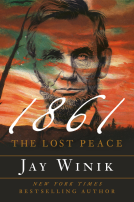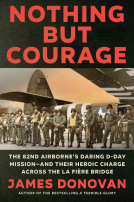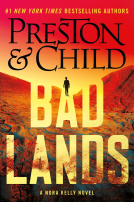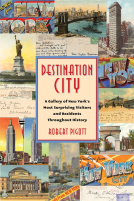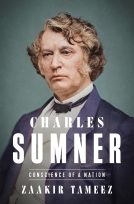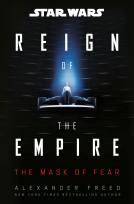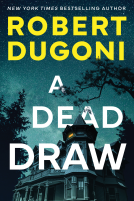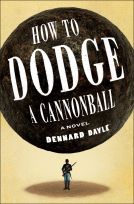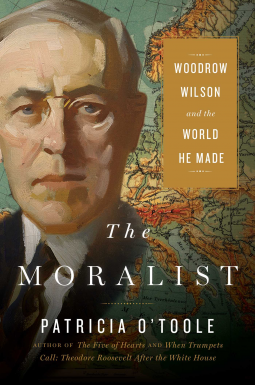
The Moralist
Woodrow Wilson and the World He Made
by Patricia O'Toole
This title was previously available on NetGalley and is now archived.
Buy on Amazon
Buy on BN.com
Buy on Bookshop.org
*This page contains affiliate links, so we may earn a small commission when you make a purchase through links on our site at no additional cost to you.
Send NetGalley books directly to your Kindle or Kindle app
1
To read on a Kindle or Kindle app, please add kindle@netgalley.com as an approved email address to receive files in your Amazon account. Click here for step-by-step instructions.
2
Also find your Kindle email address within your Amazon account, and enter it here.
Pub Date Apr 24 2018 | Archive Date Apr 24 2018
Description
“Lucid and elegant...On Wilson’s tortured entrance into World War I, [O’Toole] is truly superb...As a study of Wilson’s relationship with Europe, and the intrigues of his foreign policy administration, the book is exemplary.”—The New York Times
“O’Toole does full justice to Wilson’s complexities, but it is with the coming of the war that her narrative takes on something close to Shakespearean dimensions...scrupulously balanced...elegantly crafted.”—The Wall Street Journal
“Enlightening...O’Toole has done students of American history a great service.”—National Review
By the author of acclaimed biographies of Theodore Roosevelt and Henry Adams, a penetrating biography of one of the most high-minded, consequential, and controversial US presidents, Woodrow Wilson (1856-1924). The Moralist is a cautionary tale about the perils of moral vanity and American overreach in foreign affairs.
In domestic affairs, Wilson was a progressive who enjoyed unprecedented success in leveling the economic playing field, but he was behind the times on racial equality and women’s suffrage. As a Southern boy during the Civil War, he knew the ravages of war, and as president he refused to lead the country into World War I until he was convinced that Germany posed a direct threat to the United States.
Once committed, he was an admirable commander-in-chief, yet he also presided over the harshest suppression of political dissent in American history.
After the war Wilson became the world’s most ardent champion of liberal internationalism—a democratic new world order committed to peace, collective security, and free trade. With Wilson’s leadership, the governments at the Paris Peace Conference in 1919 founded the League of Nations, a federation of the world’s democracies. The creation of the League, Wilson’s last great triumph, was quickly followed by two crushing blows: a paralyzing stroke and the rejection of the treaty that would have allowed the United States to join the League.
After a backlash against internationalism in the 1920s and 1930s, Wilson’s liberal internationalism was revived by Franklin D. Roosevelt and it has shaped American foreign relations—for better and worse—ever since.
“O’Toole does full justice to Wilson’s complexities, but it is with the coming of the war that her narrative takes on something close to Shakespearean dimensions...scrupulously balanced...elegantly crafted.”—The Wall Street Journal
“Enlightening...O’Toole has done students of American history a great service.”—National Review
By the author of acclaimed biographies of Theodore Roosevelt and Henry Adams, a penetrating biography of one of the most high-minded, consequential, and controversial US presidents, Woodrow Wilson (1856-1924). The Moralist is a cautionary tale about the perils of moral vanity and American overreach in foreign affairs.
In domestic affairs, Wilson was a progressive who enjoyed unprecedented success in leveling the economic playing field, but he was behind the times on racial equality and women’s suffrage. As a Southern boy during the Civil War, he knew the ravages of war, and as president he refused to lead the country into World War I until he was convinced that Germany posed a direct threat to the United States.
Once committed, he was an admirable commander-in-chief, yet he also presided over the harshest suppression of political dissent in American history.
After the war Wilson became the world’s most ardent champion of liberal internationalism—a democratic new world order committed to peace, collective security, and free trade. With Wilson’s leadership, the governments at the Paris Peace Conference in 1919 founded the League of Nations, a federation of the world’s democracies. The creation of the League, Wilson’s last great triumph, was quickly followed by two crushing blows: a paralyzing stroke and the rejection of the treaty that would have allowed the United States to join the League.
After a backlash against internationalism in the 1920s and 1930s, Wilson’s liberal internationalism was revived by Franklin D. Roosevelt and it has shaped American foreign relations—for better and worse—ever since.
Available Editions
| EDITION | Other Format |
| ISBN | 9780743298094 |
| PRICE | $35.00 (USD) |
| PAGES | 640 |
Readers who liked this book also liked:
That's Not How We Do It Here!
John Kotter; Holger Rathgeber
Business, Leadership, Finance, Nonfiction (Adult)
John Kotter; Holger Rathgeber
Business, Leadership, Finance, Nonfiction (Adult)

